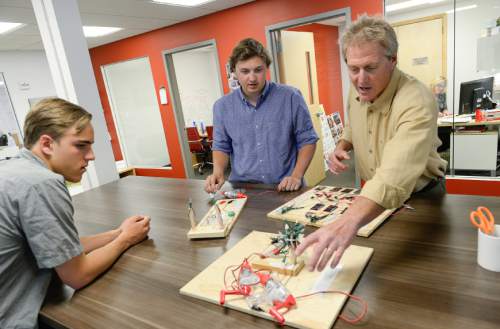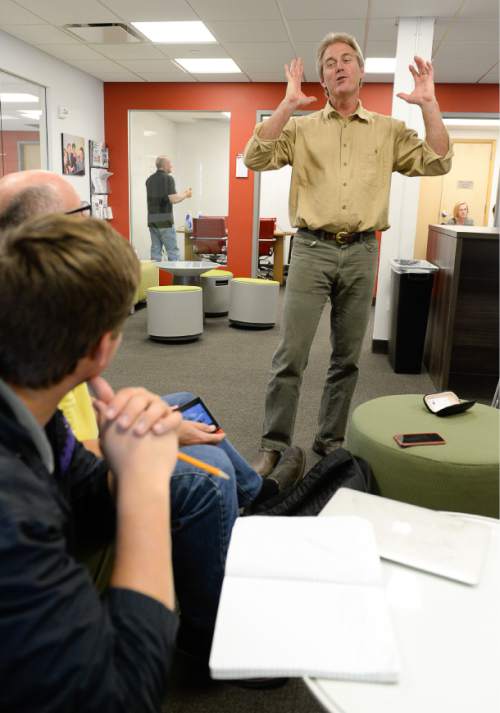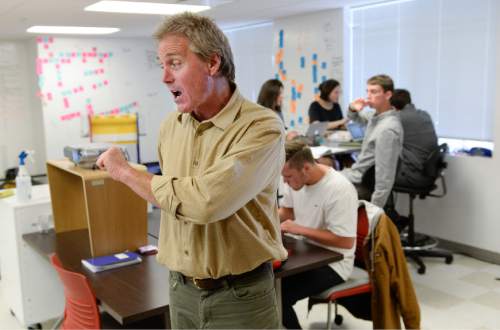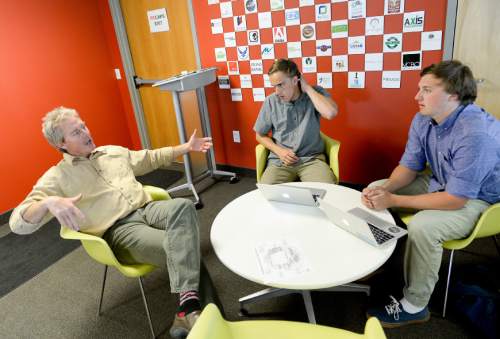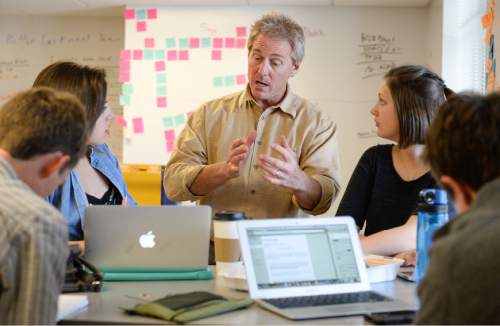This is an archived article that was published on sltrib.com in 2015, and information in the article may be outdated. It is provided only for personal research purposes and may not be reprinted.
Inside a brightly lit office suite in Park City, tech-savvy kids work on projects for Skullcandy, Adobe and Overstock.com.
But this isn't a "Silicon Slopes" startup.
It's a public school program — the Park City School District Center for Advanced Professional Studies, better known as PCCAPS, or just "Caps" for short.
The 2-year-old program operates as a satellite of Park City High School and eschews traditional classroom instruction in favor of applied learning.
And in the thick of the workshop is Charlie Matthews, a physics teacher who heads up the engineering wing of PCCAPS.
Initially skeptical of the nontraditional learning model, Matthews said he now sees PCCAPS as a "tailor-made" position for his background, which includes three years as a consulting engineer and almost three decades of classroom instruction.
"My job is to make this three-ring circus all come together," he said.
Matthews, a New York native, didn't set out to be a teacher. While working in engineering, he was intrigued by a program that paid the cost of a master's degree for students who committed to five years of teaching.
"I was thinking I probably would end up back in engineering," he said. "Obviously, here I am 29 years later. It didn't happen."
Matthews is one of five Utah educators selected for this year's Teacher Innovation Awards, sponsored by The Salt Lake Tribune and KUED.
At the Park City center, high school students work on projects for real-world clients, guided by industry mentors and a small roster of teachers.
Clients, in the form of local businesses and municipal entities, outsource their work to the center, which relies on small teams of students to collaborate on the design, production and presentation of prototypes or business strategies.
"We run it like a consulting firm," PCCAPS director Jennifer Jackenthal said. "It's like any other high school class — except it's not."
Matthews is part of that nontraditional approach — according to his students.
Park City High School junior Lucas Bothner describes him as a teacher who encourages creativity rather than issues a list of instructions to follow.
"He pushes you to create," Bothner said. "He doesn't do it himself. He pushes you to come up with the real idea."
But the teacher said he wasn't interested when he first was approached about joining PCCAPS.
"I saw this initially as a high-cost, potentially frill program," Matthews said. "I was a real naysayer."
Among Matthews' concerns was the difficulty of finding local businesses willing to outsource work to a group of high school students.
But the center's model has attracted many high-profile clients.
Lining the walls of PCCAPS are logos of former and current clients, including Zions Bank and Rocky Mountain Power.
Sam Noertker, manager of Skullcandy's advanced concept engineering team, said the company has worked with PCCAPS students on a wide range of projects, from prototype development to consumer research.
The insight of students, who represent Skullcandy's key demographic, has proven invaluable for the company, Noertker said.
"The perspectives that the kids provide are so much different than our own and they get us thinking in a lot of different ways," he said.
Noertker is one of Matthews' former students. He says Matthews has a knack for balancing both the big-picture creativity and the minute details of engineering. Noertker considers a program like PCCAPS as the future of education, and Matthews is particularly suited to get students excited about the subjects they're learning.
"He was my favorite teacher in high school," Noertker said.
Students in the PCCAPS program spend half their day at the center, located a few blocks from the Park City High School campus. The center does not accept compensation from business clients, Jackenthal said. Students get real-world experience and businesses receive fresh ideas that they may or may not implement.
"Most of the businesses aren't necessarily looking for a result," she said. "They're here because they want to give back to the community and this is something they wish they had when they were in high school."
When assembling the staff for the center, Jackenthal said she went through the roster of Park City School District teachers looking for those who were the most beloved by students and parents. Matthews stood out, she said, not just for his popularity but also as someone with experience in the engineering industry.
"He's an amazing teacher," she said. "He treats his students like adults."
Matthews said that too often, students are encouraged to arrive at a solution as quickly as possible. But in engineering, he said, an ability to fail, fail again and ultimately succeed is critical.
"Failure done right is how you learn and how you move forward," he said.
With the highest per-student spending in the state, Park City School District is uniquely suited to host a career-learning center like PCCAPS. But Matthews said similar programs that emphasize applied learning in science, technology, engineering and mathematics — collectively called STEM — could be replicated statewide.
He said PCCAPS is a natural fit for Utah's STEM initiatives and the Governor's Office of Economic Development. And if the state provided supplemental funding, he said, most Utah school districts could create a program where students solve problems for business partners.
"You can pick any community you want," he said, "and you'll be able to find projects with people who can very easily partner and mentor with those projects."
bwood@sltrib.com Five winners
Five Utah teachers have been selected for this year's Teacher Innovation Awards, which are sponsored by KUED and The Salt Lake Tribune and celebrate the creative use of technology in classrooms.
The awards are given this year based on grade levels.
Five winners will be profiled in a continuing series in The Salt Lake Tribune and a special program airing on KUED at 8 p.m. May 18.


